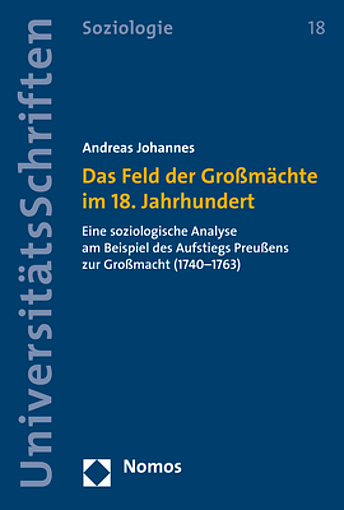englischThe concept of great powers came into being in the 18th century and persisted until the collapse of the Soviet Union in 1991. This concept created and influenced the development of modern societies in Europe and has shaped their form until now. The power to threaten other great powers, measures to discipline all citizens and the functionalisation of social sub-areas for the benefit of the absolutist potentates in Europe marked the beginning of modern Europe.
The author examines the constitution of the idea of great powers by analysing the process of Prussia being recognised as a great power under Fredrick the Great (1740–1763). By discussing the issue in terms of history and political science, the author establishes the historical-sociological point of view. Concepts from P. Bourdieu, N. Luhmann, G.H. Mead and M. Weber form a structure for the analysis on two levels: the process Prussia underwent to be recognised as a great power and – as a consequence – the communication typical of this field. Thus, the idea of the great power is conceptualised as “Historically Individual”, constituting its own tradition of modernity until now.
Das Feld der Großmächte entstand im 18. Jahrhundert und bestand bis zum Zerfall der Sowjetunion 1991. Die modernen europäischen Gesellschaften wurden durch dieses Feld geschaffen und geformt. Es prägt ihre Struktur bis heute. Bedrohungsfähigkeit nach außen, Disziplinierung nach innen und die Funktionalisierung aller gesellschaftlichen Teilbereiche für den Potentaten im Absolutismus stehen am Anfang der modernen Gesellschaften Europas.
Der Autor analysiert die Konstitution dieses Feldes am Prozess der Anerkennung Preußens als Großmacht unter Friedrich dem Großen (1740–1763). In Auseinandersetzung mit Geschichtswissenschaft und Politologie wird der historisch-soziologische Standpunkt begründet. Theoreme der Soziologien P. Bourdieus, N. Luhmanns, G.-H. Meads und M. Webers dienen dazu, eine Struktur des Feldes in zwei nicht aufeinander reduzierbaren Ebenen herauszuarbeiten: die Ebene des Prozesses der Anerkennung als Großmacht und – darauf aufbauend – die Ebene der für das Feld typischen Kommunikation.


